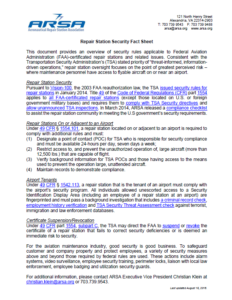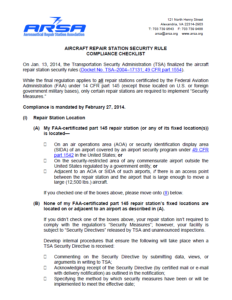COVID Dominates TSA ASAC Meeting
The Transportation Security Administration’s (TSA) Aviation Security Advisory Committee (ASAC) held its 2020 public meeting (using video teleconference) on Dec. 10.
Established in 1989 after the Pan Am Flight 103 terrorist attack, ASAC provides advice to the TSA administrator on aviation security matters, including the development, refinement and implementation of policies, programs, rulemaking and directives pertaining to aviation security. The committee is composed of individual members representing private sector organizations affected by aviation security requirements including airlines, cargo carriers, airports and others. ARSA Executive Vice President Christian A. Klein is the maintenance industry’s representative on the panel.
While most ASAC meetings are closed to outsiders to allow for the discussion of sensitive security information, the annual public meeting each December provides an opportunity for a broader audience to learn about ASAC’s activities.
In his opening statement, TSA Administrator David Pekoske expressed his appreciation for ASAC’s work, calling it, “the most representative single group I can turn to on any issue to get advice and counsel on any aviation issue.” He complimented the industry for maintaining a high level of security over the past year despite the various disruptions associated with the global pandemic.
Pekoske discussed the “Administrator’s Intent 2.0” document he released this summer, which describes how TSA intents to achieve its strategic objectives in areas including insider risk, passenger screening and cybersecurity. He also highlighted things TSA has done to respond to COVID-19, including reducing person-to-person contact during the screening process through enhanced identification verification and new x-ray technology. The latter will allow more passengers to pass through security without removing computers and liquids from their bags and reduce the number of manual bag searches.
Pekoske said the Sunday after Thanksgiving was the busiest travel day since mid-April and TSA is projecting another travel spike during the upcoming holiday period. His message to airline passengers is that TSA, airports and airlines are doing everything possible to make passenger journeys as safe as possible. However, prospective travelers should carefully consider expert health advice and weigh risks when making travel decisions.
In his opening remarks, ASAC Chairman Steve Alterman, president of the Cargo Airline Association, called 2020 “a difficult year, but not a lost year” for the committee. He emphasized the importance of ASAC’s seven subcommittees, each co-chaired by an industry and TSA representative, which facilitate collaboration in the key areas: airlines, cargo, general aviation and airport security, international issues, insider threats and security technology. He said the subcommittees are important to further cooperation between government and industry to identify gaps and develop mitigation strategies.
The bulk of the meeting was spent hearing from the various subcommittee chairmen. COVID-19 was a recurring theme in the reports, because it both created new challenges and also disrupted activities of business and government. Despite the pandemic, many subcommittees were able to make progress in key areas. Perhaps most notably, the Insider Threat Subcommittee released a white paper in August dealing with security risks and mitigations related to the pandemic.
Pursuant to 49 CFR part 1554, all FAA-certificated repair stations (except those on U.S. or foreign military bases) are required to comply with TSA security directives and allow unannounced inspections. More information about TSA’s repair station security rules is available at arsa.org/security. Members with questions or concerns are encouraged to contact ARSA.
Repair Station Security Resources |
|
| Fact Sheet | Compliance Checklist |
 |
 |
| Online Training | |
 |
|
Previously from ARSA...
8/12/20 - TSA Addresses Security During Pandemic
August 12, 2020
The Transportation Security Administration’s (TSA) Aviation Security Advisory Committee (ASAC) has released a white paper on the impact of the current global health emergency on the aviation insider risk landscape.
The paper, entitled “COVID-19-Related Aviation Insider Risk Considerations,” was developed in light of the massive disruptions to the aviation sector as a result of the pandemic. Of particular concern are potential insider risks created by pressure from mental, financial and other stressors. The report, which was prepared by ASAC’s Insider Threat Subcommittee, examines how the pandemic crisis may exacerbate the insider threat as well as ways to mitigate risk. Topics include:
- Leadership and Human Factors
- Threat Detection, Assessment and Response
- Aviation Worker Screening and Access Control
- Information Sharing
The document’s contents are not intended as formal recommendations or requirements, but rather as a starting point to evaluate security in light of coronavirus. To read the full white paper, click here.
ASAC was established in 1989 after the bombing of Pan Am flight 103. The panel provides advice to the TSA administrator on aviation security matters, including the development, refinement, and implementation of policies, programs, rulemaking, and security directives pertaining to aviation security. ARSA Executive Vice President Christian A. Klein is the aviation maintenance industry’s ASAC representative.
For more ARSA resources related to aviation security and the TSA, visit arsa.org/security.
8/18/15 - ARSA’s Fisher Appointed to TSA Advisory Committee
August 18, 2015
On Aug. 14, Peter Neffenger, administrator of the Transportation Security Administration (TSA), appointed Daniel B. Fisher to serve a two-year term representing “aeronautical repair stations” on the Aviation Security Advisory Committee (ASAC).
The ASAC provides advice to the TSA administrator on aviation security matters, including the development, refinement and implementation of policies, programs, rulemakings and security directives pertaining to aviation security. The committee is composed of individual members representing private sector organizations affected by aviation security requirements.
Fisher is a senior legislative associate with Obadal, Filler, MacLeod & Klein, P.L.C. and ARSA’s vice president of legislative affairs. He has significant experience working with repair stations around the world on issues important to the industry, including security and safety-related legislative and regulatory issues. Specifically, since the repair station security rule’s release, he has worked with ARSA members, TSA officials and members of Congress on implementation and compliance.
Established in 1989 following the Pan Am flight 103 terrorist attack, the ASAC was made a permanent group within TSA following the Aviation Security Stakeholders Participation Act’s enactment in 2014. Thanks to Fisher’s encouragement, the new law also mandated committee representation for “aeronautical repair stations” – a role the policymaking veteran was poised to fill.
“It’s an honor to represent repair stations, which I do on the association’s behalf every day,” Fisher said. “Appointment to the ASAC is chance to continue that work in a new and important way. Since all repair stations fall under TSA jurisdiction [as a result of the repair station security rule], the international aviation maintenance industry needs a seat at the table as important security matters are considered. Now I get to fill that seat and work with the agency to continue its risk-based security approach and ensure government oversight strikes the right balance between safety, security and operational freedom.”
ARSA Scores Major Victory with Passage of Aviation Security Legislation
December 16, 2014
On Dec. 12, Congress approved the Aviation Security Stakeholder Participation Act (H.R. 1204), which establishes a committee within the Transportation Security Administration (TSA) to offer feedback on the agency’s development and implementation of policies, programs, rulemakings and security directives. The legislation now heads to the president’s desk, where he is expected to sign the bill into law in the near future.
As originally introduced in the House by Rep. Bennie Thompson (R-Miss.), H.R. 1204 failed to include repair stations as part of the Aviation Security Advisory Committee (ASAC). However, ARSA’s legislative team worked with Rep. Richard Hudson (R-N.C.) on an amendment mandating repair stations as advisory panel participants. The bill passed the House and was introduced by Sen. Jon Tester (R-Mont.) in the Senate listing “aeronautical repair stations” as ASAC members along with representatives from labor unions, manufacturers, air carriers and passenger advocacy groups.
When the Aviation Security Stakeholder Participation Act is signed into law, the expanded ASAC will provide recommendations to the TSA on ways to remove redundancies and apply a more targeted approach to improving the security of our nation’s aviation network.
“ARSA commends Rep. Hudson, Rep. Thompson, and Sen. Tester for ensuring that repair stations have a voice at the Transportation Security Administration,” said ARSA’s Vice President of Legislative Affairs, Daniel Fisher. “Despite the congressional mandate that TSA regulate repair station security, the aviation maintenance industry was originally left off the Aviation Security Advisory Committee. In the end, common sense prevailed and repair stations look forward to having a seat at the table as aviation security matters are contemplated.”








